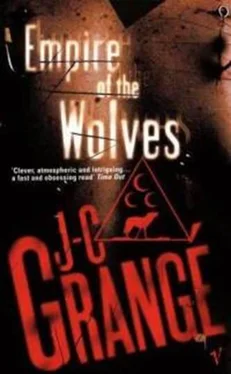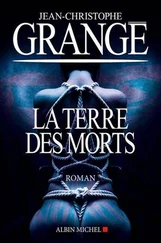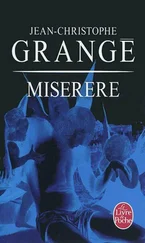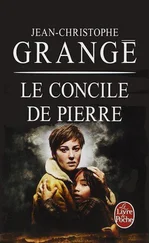"Everything's fine in that department. On the contrary, I… I feel a great desire for him. Increasingly so, in fact. It's strange."
"Perhaps not as strange as all that."
"What do you mean?"
Silence was all she got in reply.
"What's your husband's job?"
"He's a policeman."
"Sorry?"
"At the Ministry of the Interior. Laurent directs the Centre des Etudes et de Bilans. He oversees thousands of reports and statistics about criminality in France. I've never really understood what he does exactly, but it sounds important. He's very close to the minister."
Mathilde then asked, as if the question followed logically: "Why don't you have any children? Is there a problem?"
"Not a physical one, at least."
"So-why not?"
Anna hesitated. Saturday night came back to her: the nightmare. Laurent's revelations, the blood on her face…
"I don't know, actually. Two days ago, I asked my husband. And he told me that I'd never wanted any. That I even made him swear not to ask. But I can't remember that." Her voice went up a tone, detaching each syllable. "How can I have forgotten that? I just can't remember!"
The doctor jotted something down, then asked, "What about your childhood memories-are they fading, too?"
"No, they seem more distant but still present."
"And your memories of your parents?"
"None. I lost my family very young. In a car crash. I was brought up in a boarding school, near Bordeaux, with my uncle as my guardian. I don't see him anymore. I've never seen much of him, in fact."
"So what can you remember?"
"The countryside. The huge beaches of the southwest. Pine forests. Images like that are still intact in my mind. Right now, they're even get ting clearer. Those landscapes seem more real to me than the rest."
Mathilde continued to write. Anna noticed that in fact, she was doodling. Without looking up, the specialist went on: "How's your sleep? Do you suffer from insomnia?"
"The opposite, more like. I sleep all the time."
"When you make an effort to remember, does it make you feel sleepy?”
“Yes, I get a feeling of torpor."
"Tell me about your dreams."
"Since the beginning of my illness, I've been having a strange dream.”
“G oon."
Anna described her recurring nightmare. The station and the peasants. The man in the black coat. The flag decked with four moons. The sobbing children. Then the terrible gust of wind, the hollowed torso, the face in ribbons…
The psychiatrist whistled in admiration. Anna was not sure if she appreciated the woman's familiar manner, but she felt comforted by her presence. Suddenly, Mathilde froze her heart: "You've consulted someone else, I suppose?"
Anna trembled.
"A neurologist?"
“… what makes you think that?"
"Your symptoms are rather clinical. Those memory blocks and hallucinations bring to mind a neurodegenerative disease. In such cases, patients generally consult a neurologist. A doctor who directly pinpoints the cause and treats it with medication."
Anna gave in. "He's called Ackermann. A childhood friend of my husband."
"Eric Ackermann?"
"You know him?"
"We were at university together."
Anna asked anxiously "And what do you think of him?"
"He's brilliant. What was his diagnosis?"
"He just made me do tests. Scanners. X-rays. an MRI."
"Didn't he do a PET scan?"
"Yes. We did the tests last Saturday. In a hospital full of soldiers.”
“Val-de-Grace?"
"No, at the Henri-Becquerel Institute in Orsay."
Mathilde jotted down the name on a corner of her paper. "And what were the results?"
"Nothing very clear. Ackermann thinks I'm suffering from a lesion in the right hemisphere, in the ventral temporal cortex "
"The region that recognizes faces."
"That's right. He reckons it must be a tiny necrosis. But the machine failed to localize it."
"And according to him, what caused the lesion?"
Anna spoke quickly, feeling good that she was making a clean breast of it. "That's the problem. He doesn't know. So he wants to carry out more tests" Her voice broke. "A biopsy to analyze that part of my brain. He wants to study the nerve cells, or something. I.." She paused for breath. "He says that he needs to do that in order to treat me."
The psychiatrist laid down her pen and crossed her arms. For the first time, she seemed to be looking at Anna with neither irony nor cheekiness. "Did you tell him about your other problems? Your memories fading away? Faces mixing together?"
"No."
"Why, don't you trust him?"
Anna did not answer.
Mathilde pressed the point. "Why did you come to see me? Why tell me all this?"
Anna gestured vaguely, then, her eyes lowered, she said, "I refuse to have the biopsy. They want to enter inside my mind."
"Who do you mean?"
"My husband and Ackermann. I came here in the hope that you'd have a different idea. I don't want them to make a hole in my head!”
“Calm down."
She looked up, on the verge of tears. "Can I… can I smoke?" The psychiatrist nodded.
Anna lit up at once. When the smoke cleared, the smile had returned to the face in front of her.
Inexplicably, a childhood memory came to mind. Long walks on the moors with her class, then back to the boarding school, her arms full of poppies. They were then told they should burn the stalks of the flowers to make their colors last longer…
Mathilde Wilcrau's smile reminded her of that strange alliance between fire and life in the petals. Something had burned inside that woman and was keeping her lips red.
The psychiatrist paused once more, then asked calmly "Did Ackermann tell you that amnesia can be set off by a psychological shock, and not necessarily by a physical lesion?"
Anna exhaled abruptly "You mean… my problems could have been caused by a traumatic experience?"
"That is possible. Violent emotions can lead to memory loss."
A wave of relief invaded her. She knew that she had come there to hear those words. She had chosen a psychoanalyst in order to return to the purely mental side of her illness. She could barely contain her excitement. "But this shock," she said between puffs, "I'd remember it, wouldn't I?"
"Not necessarily. Amnesia generally wipes out its own source. The founding moment."
"And this trauma might have something to do with faces?”
“That's likely. Faces, and also your husband."
Anna leapt to her feet. "What do you mean, my husband?"
"To judge by the signs you mentioned, they seem to be the two main blocks."
"You think Laurent caused an emotional shock?"
"That's not what I said. But in my opinion, everything is connected. The shock you had, if there was one, has brought about an association between your amnesia and your husband. That's all I can say for now."
Anna was silent. She stared at the glowing tip of her cigarette. "Can you gain some time?" Mathilde asked.
"Gain time?"
"Before the biopsy"
"You.. you'd agree to treat me?"
Mathilde picked up her pen and pointed it at Anna. "Can you put off the biopsy, yes or no?"
"I think so. For a few weeks. But if the attacks-“
"Do you agree to plunge into your memory using language?”
“Of course."
"Do you agree to come here on an intensive basis?"
"Yes."
"To use techniques of suggestion, such as hypnosis, for example?”
“Yes."
"And injections of a sedative?"
"Yes, yes, yes."
Mathilde dropped her pen. The white star of the Montblanc was glittering. "Trust me. We'll decipher your memory"
Her heart was aflame.
She had not felt so happy for a long time. The simple idea that her symptoms might be caused by a psychological trauma, and not by physical deterioration, gave her new hope. After all, it might mean that her brain had not been altered or attacked by a necrosis that was spreading through her nervous system.
Читать дальше












